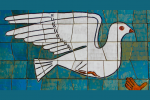February 3, 2020
Crowds, Rocks, and Seeing the Face of God

Once again, Episcopalians (and others!) are participating in the Good Book Club. This time, we are reading through the Gospel of John, and this week is mostly John 8. As I read through John 8, I see many themes: sin, forgiveness, death, new life, and more. But again, one overarching theme: Discipleship.
John 8 begins and ends with crowds and stones. It opens with a crowd gathered around a woman caught in adultery and ends with a crowd gathered around Jesus. The crowds saw an adulterous woman and a demon-possessed liar, and the crowds wanted to kill them both.
But Jesus saw something different. In the woman, he saw a child of God. And in himself, he saw the son of God.
When we look at others, particularly when we’re part of the in-group and the “other” isn’t, what do we see?
Crowds often have a way of distorting what we see. Maybe it’s peer pressure, or herd mentality, or just pure excitement in numbers, but being part of the crowd often makes me - and maybe you, too, if you’re honest - glad I’m not one of those outsiders.
Faithful followers of Jesus can disagree on many issues, liturgical, social, political, and more. But faithful followers of Jesus must approach each other as siblings in Christ. We must see in each other a child of God. And we can’t be in the business of making insiders and outsiders.
Where I serve, in Upper South Carolina, Bishop Andrew Waldo has focused his Episcopal visitations these past few years on “Christian maturity in an age of alienation.” In his forums, he asks those gathered to name the issues that divide us. You can guess the answers: sex, money, drugs, guns, etc. He then asks what personal qualities feed those divisions. Again, the answers are obvious: greed, fear, pride, envy, etc.
Then he asks the question at the root of discipleship: what are the qualities of someone who follows Jesus. We’ve done the math, and after visiting all 60 congregations and several other groups, the responses most often repeated are:
Love
Generosity
Forgiveness
Humility
Compassion
Selflessness
Patience
Kindness
Courage
Faith
Acceptance
Prayer
Then Bishop Waldo goes one step further. When we come upon one of those issues that divide us (guns, sex, money, etc.), how would it change us - and our interactions - if we deliberately sought to embody those 12 discipleship characteristics?
When we find someone with a different opinion, what is the generous response? When we are in a conversation with people saying hurtful things, what is the courageous response? When we meet someone who isn’t like us, what is the kind response?
In essence, we’re asking that seminal 1990’s youth group question: WWJD.
Because it’s easy for us to fall in the trap of being a crowd with rocks. It’s easy for us to find folks with whom we disagree, and want to force them to change or leave. It’s easy for us to see ourselves as the ones with the right answers.
But God asks us to go deeper. God asks us to be different. God asks us to see and engage with the “other,” the “enemy,” and the “opponent,” as a child of God.
So how do we build up these qualities, in ourselves and others? How do our congregations, dioceses, seminaries, and other institutions help us develop these qualities?
This blog is part of a series for the Good Book Club. Learn more about the Good Book Club here.





